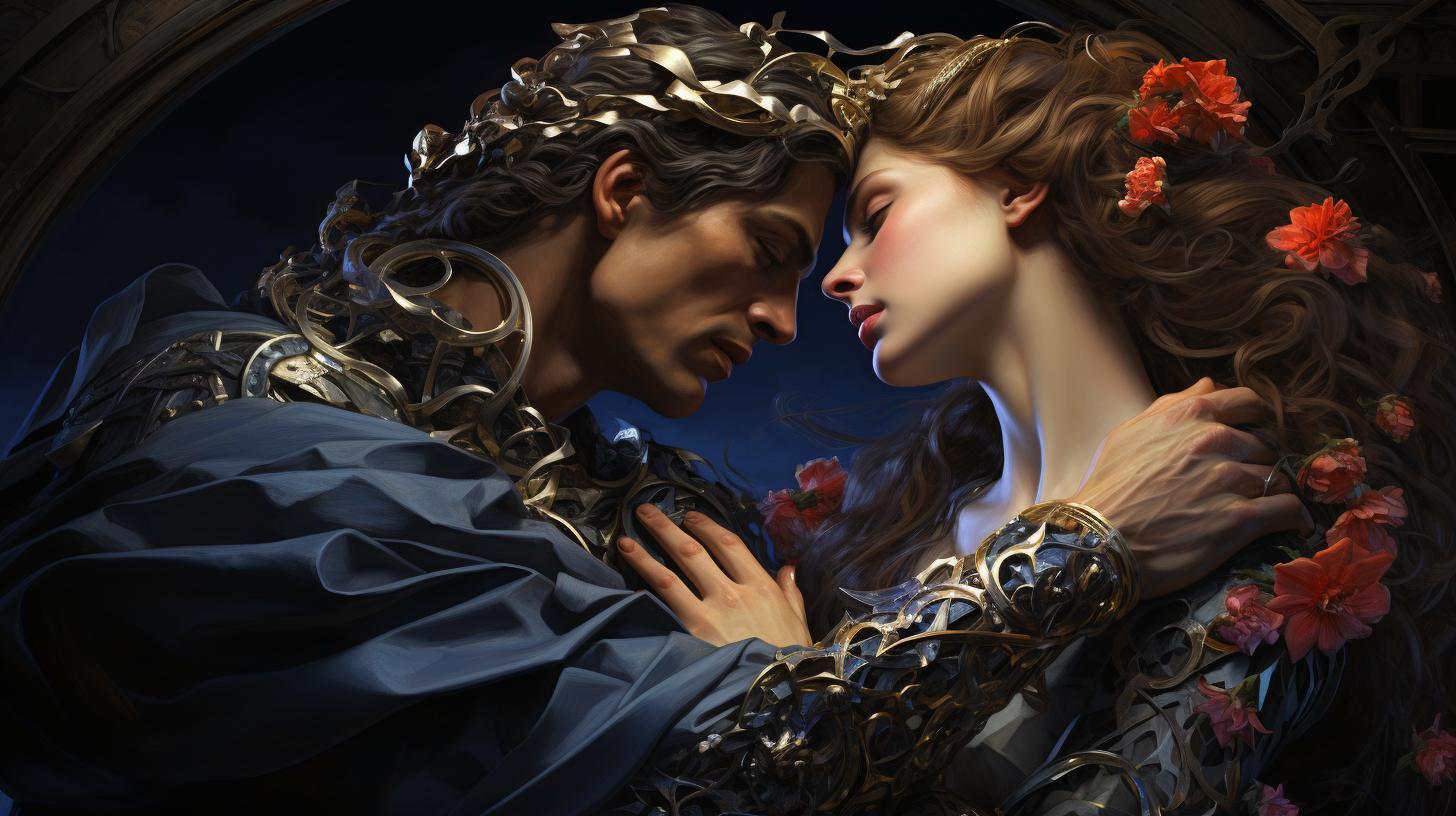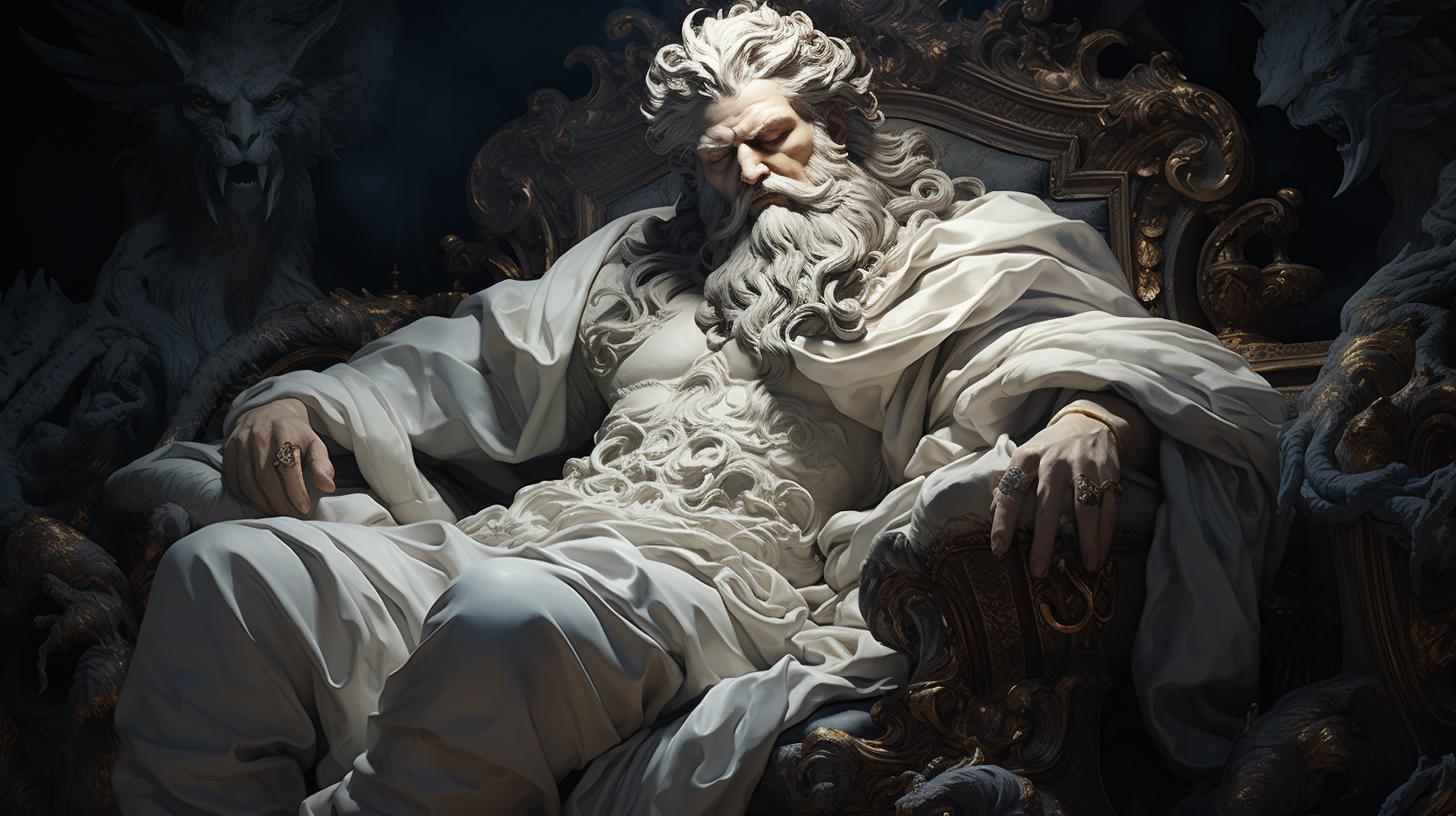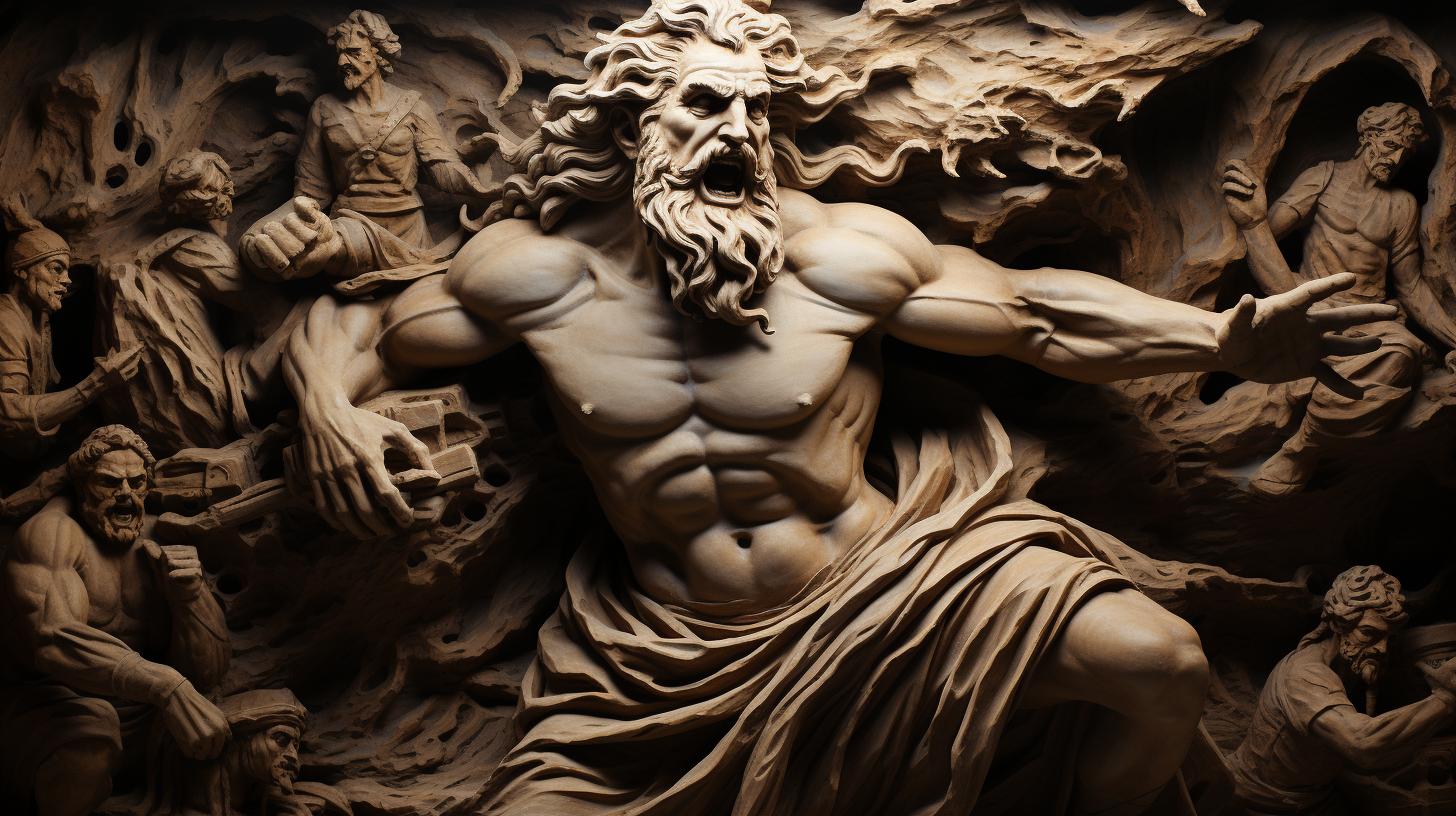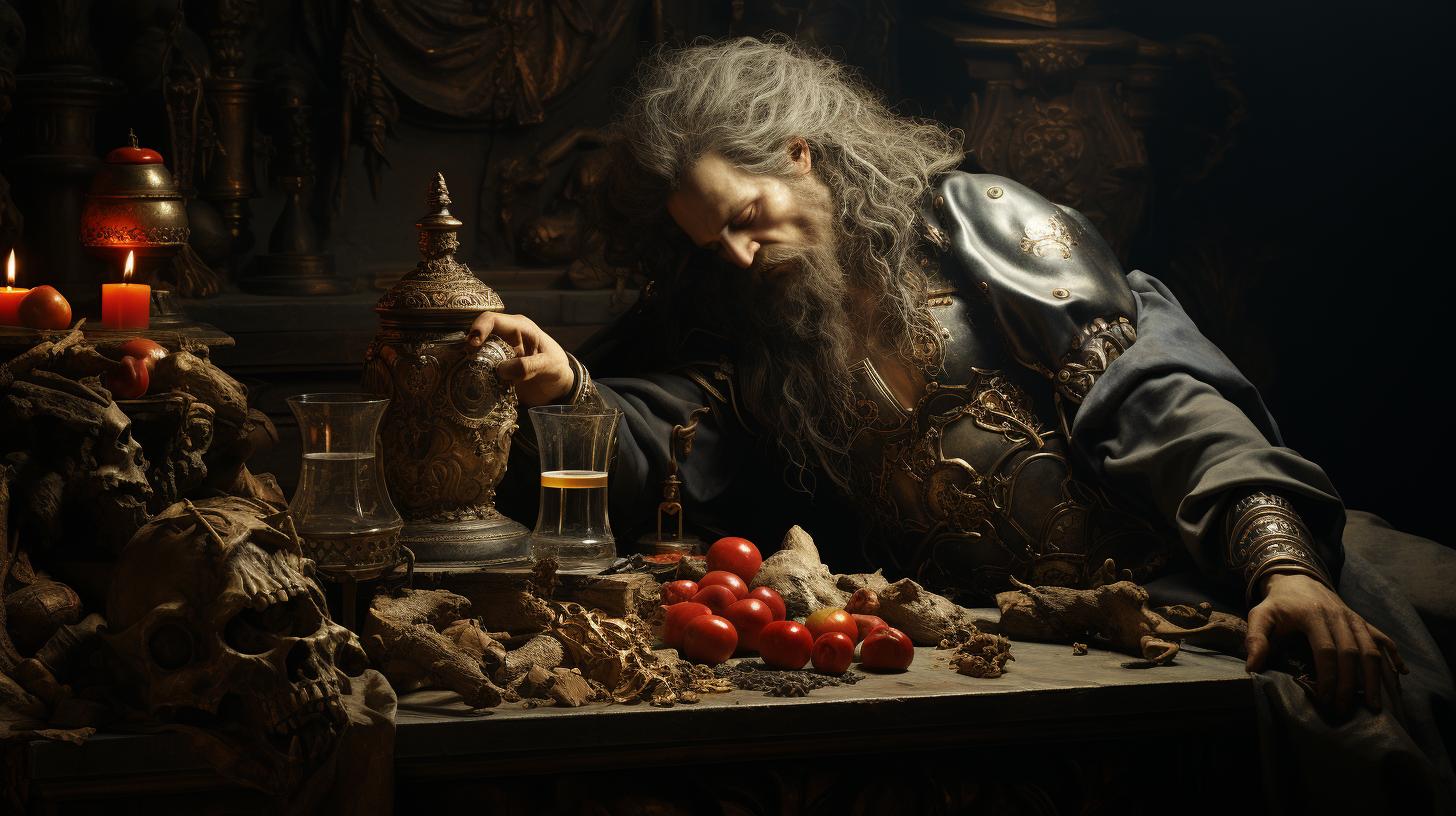Cadmus And Harmonia: The Legendary Greek Mythology Tale of Love and Tragedy

Cadmus And Harmonia are prominent figures in Greek mythology, entwined in a tale of love and tragedy. Cadmus, the founder of Thebes, embarked on a journey to rescue his sister Europa and ended up establishing the city they would call home.
Known for introducing the Phoenician alphabet to the Greeks, Cadmus left a lasting cultural legacy. His marriage to Harmonia, daughter of Ares and Aphrodite, brought forth a doomed family lineage.
Their tragic fates led them to retreat and transform into serpents, leaving behind a story that continues to captivate. Explore the enthralling myth of Cadmus And Harmonia, rich in symbolism and ancient Greek lore.
Historical Background of Cadmus and Harmonia
The historical background of Cadmus and Harmonia encompasses their origin, lineage, and the intertwined mythological story that connects them. This section delves into their individual tales before exploring their relationship and the significance it holds.
Origin and Lineage of Cadmus
Cadmus, a legendary hero in Greek mythology, was born of Phoenician descent. He was the son of King Agenor and Queen Telephassa of Tyre. With three siblings, Phoenix, Cilix, and Europa, Cadmus embarked on a journey to rescue his sister from the clutches of Zeus.
The Mythological Story of Harmonia
Harmonia, the daughter of the Greek deities Ares and Aphrodite, brings her own mythical tale to the union with Cadmus.
Her divine parentage merges the worlds of war and love, adding intrigue to the narrative surrounding Cadmus and Harmonia.
Connection between Cadmus and Harmonia
The union between Cadmus and Harmonia brings together two legendary figures in Greek mythology, intertwining their stories and fates. Their marriage births a lineage marked by tragedy and transformation, creating a captivating tale of love and sorrow.
Cadmus: The Founder of Thebes
Cadmus, a legendary figure in Greek mythology, played a significant role in the founding of the ancient city of Thebes. This section delves into Cadmus’ journey to find his sister Europa, the decision to establish Thebes, and the enduring legacy of the Cadmeia, an acropolis named in his honor.
Cadmus’ Journey to Find Europa
Driven by a fervent desire to rescue his sister, Cadmus embarked on a perilous quest to find Europa, who had been abducted by Zeus. His arduous journey took him to the sacred island of Samothrace, where he finally found Europa along with his mother and nephew Thasus.
Together, they returned to their homeland, Tiro.
Cadmus’ Decision to Found Thebes
Rather than returning to a life of ease, Cadmus made a groundbreaking decision that shaped the course of history. He resolved to establish a city that would bear his name, and thus Thebes was born.
This significant choice became a testament to Cadmus’ ambition and determination.
The Cadmeia: A Tribute to Cadmus’ Legacy
The acropolis of Thebes, known as the Cadmeia, stood as a testament to Cadmus’ lasting impact. As a tribute to his foundational contribution, the Cadmeia symbolized the strength and grandeur of the city.
It stood as a constant reminder of Cadmus’ visionary leadership and enduring legacy.
Cadmus and the Introduction of the Phoenician Alphabet
Cadmus, the legendary founder of Thebes, played a significant role in bringing the Phoenician alphabet to Greece. This section delves into Herodotus’ account of Cadmus’ introduction of the alphabet and explores the significance it held in ancient Greece.
Herodotus’ Account of Cadmus’ Introduction of the Alphabet
According to the Greek historian Herodotus, Cadmus brought the Phoenician alphabet to Greece around 2000 BC. As Cadmus embarked on his journey to find his sister Europa, he arrived in Samothrace, a sacred island for the “Great Gods.”
Accompanied by his mother and nephew Thasus, Cadmus found Europa and returned to Tyre.
However, instead of returning home, Cadmus decided to establish the city of Thebes. Legend has it that Cadmus used the Phoenician alphabet to inscribe the divine oracles on the trípodes of the Temple of Apollo in Thebes, thus introducing this system of writing to the Greeks.
Significance of the Phoenician Alphabet in Ancient Greece
The introduction of the Phoenician alphabet by Cadmus marked a significant turning point in the history of Greek civilization. Prior to this, the Greeks relied on linear B script, which was not as versatile as the Phoenician alphabet.
The adoption of the Phoenician alphabet enabled the Greeks to develop their own writing system, which eventually evolved into the Greek alphabet. This new script facilitated the recording of information, expanded literacy, and served as a foundation for the development of Greek philosophy, literature, and culture.
The Phoenician alphabet’s simplicity and adaptability allowed the Greeks to express a wide range of sounds and ideas, making it a versatile tool for communication. It was a crucial factor in the intellectual and cultural advancement of ancient Greece.
In conclusion, Cadmus played a pivotal role in introducing the Phoenician alphabet to Greece, as recounted by Herodotus. This momentous event revolutionized Greek writing and had a profound impact on the development of Greek civilization.
The Phoenician alphabet’s adoption paved the way for the flourishing of Greek culture and set the stage for future intellectual achievements.
-
From the union of Cadmus and Harmonia, their children emerged as influential figures within the city.
Cadmus’ Children and Their Influence on Thebes
One of Cadmus and Harmonia’s notable children was Semele, who eventually became the mother of the god Dionysus. Through Semele’s lineage, the worship of Dionysus thrived in Thebes, with the city becoming an important center for the Dionysian cult.
In addition, Cadmus’ son, Polydorus, was a renowned military strategist. He was instrumental in fortifying the defenses of Thebes and played a crucial role in protecting the city from external threats.
Cadmus and the Trojan War: The Involvement of Thebes
As descendants of Cadmus, the family of Thebes found themselves entangled in the events leading up to the Trojan War. Cadmus’ grandson, Pentheus, was the king of Thebes during the time of the conflict, and his resistance against the war ignited tensions with the Greeks.
Thebes played a crucial role in the overall narrative of the Trojan War. Cadmus’ great-grandson, Diomedes, was among the renowned Greek warriors who participated in the conflict. Thebes contributed soldiers and resources to the Greek cause, adding to the complexity and scale of the war.
Other Tales and Legends Associated with Cadmus’ Legacy
Beyond their reign in Thebes, the descendants of Cadmus were involved in various tales and legends. Actaeon, a great-grandson of Cadmus, was transformed into a stag by Artemis after unintentionally witnessing her bathing.
This unfortunate incident became a well-known story, highlighting divine punishment and the consequences of hubris.
Another descendant, Pentheus, met a tragic fate when he opposed the worship of Dionysus. He was torn apart by the frenzied Bacchantes, followers of the god, as a result of his rejection of their rituals.
This tale warned of the dangers of denying divine forces and disrupting the natural order.
Overall, the descendants of Cadmus held influential positions in Thebes and were entwined in significant events of Greek mythology.
Their stories added depth and complexity to the mythological landscape, illustrating the far-reaching consequences of divine bloodlines.
Tragic Fates and Transformation of Cadmus and Harmonia
The story of Cadmus and Harmonia takes a tragic turn as their family life is plagued by misfortunes and ultimately leads to their transformation. Let’s explore the troubled events that unfold in their lives and the mythological significance behind their dramatic transformation into serpents.
Cadmus and Harmonia’s Troubled Family Life
Cadmus and Harmonia, despite their initial love and marriage, faced numerous challenges and tribulations in their family life. The couple had five children together, but their offspring were not spared from tragedy.
The family was plagued by unfortunate events and misfortunes, which brought great sorrow and despair to Cadmus and Harmonia.
Retreat to Illyria and Transformation into Serpents
Weary from their ongoing hardships, Cadmus and Harmonia decided to retreat from Thebes and seek refuge in Illyria. However, their fate took an unexpected turn as they were transformed into serpents.
This profound transformation marked the end of their mortal existence and signaled a shift into a different realm of existence.
The Mythological Significance of Their Transformation
The transformation of Cadmus and Harmonia into serpents holds significant mythological symbolism. In Greek mythology, serpents are often associated with wisdom, renewal, and transformation. The serpentine form represents a transition into a state beyond mortality, signifying a deeper spiritual transformation and liberation from the burdens of earthly existence for Cadmus and Harmonia.
Other Ancient Greek Mythological Tales Related to Cadmus and Harmonia
In addition to the captivating story of Cadmus and Harmonia, Greek mythology is rich with other fascinating tales that intertwine with their narrative.
These myths shed further light on the heroic exploits and mythical connections surrounding these legendary figures.
The Calydonian Boar Hunt
One such captivating tale is the Calydonian Boar Hunt, a heroic feat undertaken by several renowned Greek heroes. It all began when Oeneus, king of Calydon, failed to honor Artemis with a proper sacrifice.
In anger, the goddess sent a monstrous boar to terrorize the land. Meleager, Atalanta, and other heroes, including some of Cadmus and Harmonia’s descendants, joined forces to hunt down and defeat the ferocious creature.
The Olympic Games and Eleusinian Mysteries
The Olympic Games, intertwined with ancient Greek traditions and sportsmanship, hold a significant place in Greek mythology. Legends link the origins of the Olympics to the divine hero Heracles, who was a descendant of Cadmus and Harmonia. The Games honored the gods and showcased physical excellence while fostering unity among the Greek city-states.
Additionally, the Eleusinian Mysteries, secret religious rites celebrated in honor of the goddess Demeter and her daughter Persephone, also feature in Greek mythology. These mystic rituals played a crucial role in the beliefs and spiritual practices of the ancient Greeks, offering initiates the promise of a blessed afterlife.
The Quest for the Golden Fleece
A legendary tale that captures the imagination is the Quest for the Golden Fleece, which involved a band of heroes, including the famous Jason of the Argo. Seeking to reclaim his rightful throne, Jason embarked on a perilous journey alongside mighty warriors, such as Hercules, who had direct connections to Cadmus and Harmonia. Their pursuit led them to face formidable challenges and encounter magical beings, ultimately culminating in the triumph of the Argonauts.
These additional tales highlight the interconnectedness of Greek mythology and its characters, including their ties to the lineage of Cadmus and Harmonia. Each tale offers unique adventures, heroic deeds, and mythical encounters that continue to mesmerize audiences even today.
See Also
Explore other Greek myths and characters that are related to the fascinating tale of Cadmus and Harmonia. These mythological stories provide further insights into the rich tapestry of Greek mythology:
Other Greek Myths and Characters
- The Twelve Labors of Hercules: Discover the heroic feats and trials of Hercules, another prominent figure in Greek mythology.
- The Odyssey: Join Odysseus on his epic journey back home after the Trojan War, encountering various creatures and obstacles.
- Prometheus and Pandora: Uncover the stories of Prometheus, who brought fire to humanity, and Pandora, who opened a box filled with evils.
Importance of Cadmus and Harmonia’s Story
The myth of Cadmus and Harmonia holds significant importance in Greek mythology.
It exemplifies the consequences of divine unions and the complexities of human relationships. Furthermore, their tragic fate and transformation into serpents symbolize the cyclic nature of life and the eternal struggle between love and suffering.
Notes
Within the vast realm of Greek mythology, the tale of Cadmus and Harmonia holds a significant place. This section provides additional insights and noteworthy points related to their captivating story:
- Cadmus, the legendary founder of Thebes, embarked on a perilous journey to find his abducted sister, Europa.
- Despite successfully rescuing Europa and returning to his homeland of Tyre, Cadmus chose a different path and founded the illustrious city of Thebes instead.
- Cadmus’ introduction of the Phoenician alphabet to Greece revolutionized written communication and paved the way for the development of the Greek alphabet.
- The descendants of Cadmus played significant roles in the history of Thebes, including their involvement in the infamous Trojan War.
- The tragic fate of Cadmus and Harmonia, along with their transformation into serpents, highlights the complexities and hardships within their family lineage.
- The repercussions of Cadmus and Harmonia’s story extend beyond their own narrative, intertwining with various other ancient Greek myths and legends.
By delving deeper into these notes, one can gain a deeper understanding of the intricate details and broader implications of Cadmus and Harmonia’s mythological saga.




















